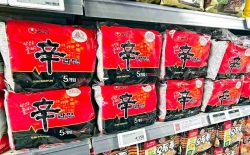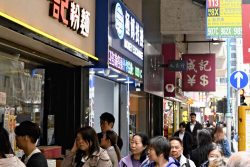16:21 JST, May 18, 2022
Singapore has been ranked second in the world — behind Cambodia and just ahead of Thailand — in a study measuring China’s expanding influence on countries.
In the areas of technology, society and academia — but less so for domestic politics — the Republic was found to be especially susceptible to the exposure, pressure and effect of Beijing’s influence, according to the China Index launched late on April 25 by Taiwan-based research outfit Doublethink Lab.
The inaugural index placed the Philippines in sixth, Malaysia eighth and Taiwan ninth with Australia rounding off the top 10.
Bosnia and Herzegovina, Colombia and Paraguay were identified as least influenced by China, in a list spanning 36 territories across Asia, Europe, Australasia, Africa and the Americas.
In 15th position was the United States, which remains embroiled in an intense multidimensional rivalry with an ascendant China.
The index is billed as the first to gauge the extent of Chinese influence using comparable data, collected from March to August 2021 and involving 99 indicators across nine domains: media, foreign policy, academia, domestic politics, economy, technology, society, military and law enforcement.
The indicators further fall into three categories: exposure — how vulnerable the country is; pressure — actions taken by China to change the behavior of people in the country; and effect — the degree to which the country accommodates China, and the impact of these actions.
A committee convened by Doublethink Lab designed the indicators, each of which was then assessed on a four-point scale by at least two anonymous local experts — either academics, journalists, researchers or community leaders — who must provide corresponding evidence.
The eight-person committee largely comprised U.S. and Western analysts such as Bonnie Glaser from the U.S. research institution German Marshall Fund and Nadege Rolland from the Washington-based think-tank National Bureau of Asian Research, with the exception of Roy Chun Lee from the Taiwan WTO and RTA Centre at the Chung-Hua Institution for Economic Research.
Singapore’s percentage scores were higher than the world average across all domains except for domestic politics, which evaluates China’s efforts to influence the political landscape in a country.
These findings follow a Pew Research Centre survey released in June 2021, which found that 64% of Singaporeans had a favorable view of China, and that Singaporeans were the only ones in the world to view China more positively than the United States.
In September last year, French think-tank Irsem (Institute for Strategic Research at France’s Military College) also identified Singapore — where ethnic Chinese make up about three-quarters of the citizen and resident populations — as being particularly vulnerable to Chinese influence.
Singaporeans have also been observed taking to online forums to share anecdotes of fathers and grandfathers being “self-radicalized” by Chinese propaganda.
The China Index pointed to the popularity of the WeChat messaging platform among older Chinese-speaking adults here — and TikTok for the younger demographic — as evidence of Chinese influence in the technology domain. The domain looks at the activity and financial leverage of Chinese companies in the tech sector, the use of Chinese hardware and bilateral research partnerships.
Singapore topped this area, with Indonesia coming in second.
Singapore also registered the third-highest score — with Taiwan coming in first — in the domain of society, which assesses China’s soft-power efforts and hold over local organizations and citizens.
In academia, Singapore also placed third, with the U.S. first and Germany second. The index noted Chinese-language teachers have been hired from China to work in schools and tuition centers, along with reports of Chinese-language curriculum material increasingly following China’s standards.
Singapore was fifth when it came to China’s economic leverage over policy or corporate behavior, with New Zealand top of the table. The index said that in 2016, after an arbitral tribunal’s ruling against China’s claims to a handful of islands in the South China Sea, Singapore businesses were reportedly “warned” that Singapore’s insistence on international law could jeopardize their commercial position in China.
In the domain of foreign policy, the index claimed that Singapore has become “visibly quieter” over the South China Sea dispute and international rule of law relating to China ever since the 2016 detention of Singapore’s army vehicles in Hong Kong while en route home from Taiwan.
Ambassador Ong Keng Yong, who is director of the Institute of Defense and Strategic Studies at the S. Rajaratnam School of International Studies, said while the subject of Chinese influence is of interest, it was just as key to consider the “bigger picture.”
“I would look at who is doing the survey and its past research records … how relevant are the parameters used, and why the report is being produced and circulated,” he said.
Taipei-based Doublethink Lab describes itself as a civil society organization investigating disinformation and information operations in order to safeguard democracy globally.
Meanwhile, political analyst Chong Ja Ian from the National University of Singapore said the presence of Chinese influence in Singapore was unsurprising, given the significance of economic, social, academic and technological interactions between the two countries — something that successive administrations here have promoted since 1990s.
“Such interactions also come with Singapore being a small, open economy, which makes cooperation and collaboration especially important,” said Associate Professor Chong.
“The question is whether such presence translates into such issues as stress on society; the distortion of the political process that unduly advantages some while excluding others; or results in policies that may not serve overall public interest as well as they should.”
Top Articles in World
-

Israeli Ambassador to Japan Speaks about Japan’s Role in the Reconstruction of Gaza
-

China Eyes Rare Earth Foothold in Malaysia to Maintain Dominance, Counter Japan, U.S.
-

North Korea Possibly Launches Ballistic Missile
-

Chinese Embassy in Japan Reiterates Call for Chinese People to Refrain from Traveling to Japan; Call Comes in Wake of ¥400 Mil. Robbery
-

Pentagon Foresees ‘More Limited’ Role in Deterring North Korea
JN ACCESS RANKING
-

Japan Institute to Use Domestic Commercial Optical Lattice Clock to Set Japan Standard Time
-

Israeli Ambassador to Japan Speaks about Japan’s Role in the Reconstruction of Gaza
-

Man Infected with Measles May Have Come in Contact with Many People in Tokyo, Went to Store, Restaurant Around When Symptoms Emerged
-

China Eyes Rare Earth Foothold in Malaysia to Maintain Dominance, Counter Japan, U.S.
-

Prudential Life Insurance Plans to Fully Compensate for Damages Caused by Fraudulent Actions Without Waiting for Third-Party Committee Review























